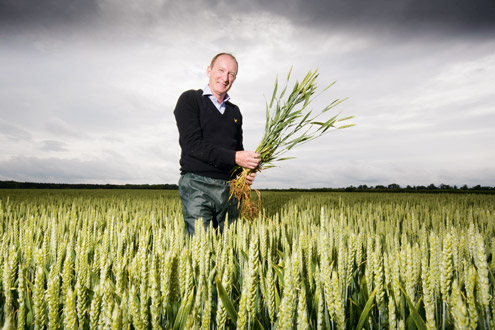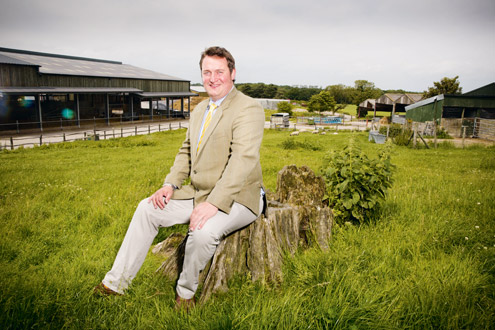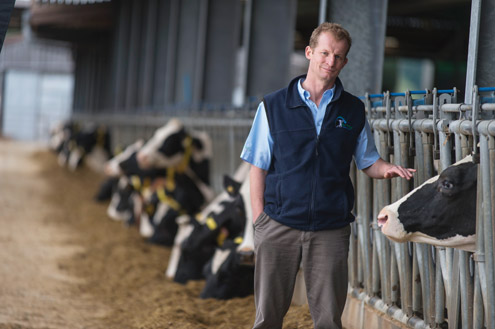2013 Farmers Weekly Farm Adviser finalists revealed

0ur three Farm Adviser of the Year finalists are constantly trying out new things in a bid to deliver for their own businesses and those of their clients. Debbie Beaton reports on three men who are really showing what a skilled farm adviser can bring to a farming business

Keith Norman
Technical director, Velcourt Farming
Keith Norman has been likened to an “industrial Dyson” – hoovering up a huge amount of technical information and science and filtering out the bits that give him, and his farm managers, the commercial edge.
Farm facts
- Oversees 5,500 trial plots that inform his crop management guidelines and advice
- Advises 46 Velcourt farm managers managing 53,000ha in the UK; 19,000ha overseas
- Velcourt-managed wheat yields are 1.5t/ha more than the UK average
As technical director at Velcourt he has been providing advice and crop management guidelines for its farm managers, who now number 46, for more than 25 years. It’s not simply his experience, but also his scientific knowledge and a voracious appetite to learn more that sets him apart as one the country’s leading influences on arable production.
The company manages 53,000ha in the UK, as well as a further 19,000ha overseas in Ukraine, Spain, France, Germany and Zambia.
His crop guidelines are based on trials overseen by him: “It’s essential to have independent data on which to base crop management recommendations. Manufacturers often draw different conclusions from trials, making truly independent data and advice hard to come by,” he says.
The Velcourt trials provide him with an advance insight on new chemistry, techniques and tools, enabling Velcourt-managed farms to consistently deliver 1.5t/ha above-average yields.
And this effect has been felt overseas, where wheat yields were lifted from 5t/ha to 8.5t/ha in one year at the Duke of Arion’s estate at Toledo in Spain. The estate became a showcase for many others to see how matching product choice, application timing and rates to the environment, weed, pest and disease pressures could so dramatically lift yields and profits.
Being the “first to know” is a key driver of Velcourt’s investment in 5,500 plots and a six-man trial team. That combined with Keith’s wide industry involvement encompassing the R&D HGCA committee, BBSRC, John Innes Centre, and AgTech strategy to name but a few keeps him ahead of the game – and a key influence on UK crop production right up to government level.
His interest in how science can directly benefit commercial crop production has spread beyond agricultural science, in particular to the potential of electronic sensor designs, high-resolution cameras and unmanned aircraft systems to aid crop management.
At this year’s Cereals event, the Velcourt demonstration plots hosted a trial of new “waxless” wheat plants. John Innes researchers identified a chromosome responsible for altering leaf wax and the resulting varieties are now being trialled by Velcourt. “It’s an exciting development: waxless leaves reflect less light, allowing more to penetrate to the bottom leaves and potentially deliver a 10% yield advantage,” says Keith.
It’s this ability to scrutinise the science and practically apply it that marks him out, says AHDB’s Susannah Bolton. “Keith’s breadth and depth of knowledge is quite unique, enabling him to play a critical role in knowledge exchange for the whole industry,” she says.
How does the atypical advisory relationship between Keith and his “captive clients” of Velcourt farm managers work? He describes it as a two-way street. Advice is made on the science and data generated in-house, but weekly field meetings with the farm managers ensure they can influence and challenge, he explains.
He is a strong believer that a successful adviser has to be a good listener and learn from other people’s experiences.
Velcourt farm manager Tim Whitehead says he would find it very difficult to deliver the results he does without Keith’s input: “We would be running blind with some things, without the scientific rigour that underpins his advice.”
Fees for advice to non-Velcourt farming clients is up to three times that of average agronomy fees, which simply reflect the value that is placed on independent trials, analysis and Keith’s scientific interpretation.

Douglas Jackson
AG Advisory, Horam, East Sussex
Doug Jackson is a young man on a mission. He cut his advisory teeth at Bidwells, Savills and Laurence Gould Partnership, before setting out on his own at Horam in East Sussex less than 12 months ago.
Farm facts
- Strategic business advice on a cross-spectrum of farm businesses, ranging from 20-1,820ha
- Business appraisals, restructuring and diversification
- Rural research for private companies and government
“I want to build a business that offers proactive modern thinking, but still incorporates the traditional core client values,” he says. He sees his role as identifying the highest-value opportunities for his clients; understanding their personal and business needs and providing the expertise to deliver on those goals.
Budgeting, cashflow forecasting, diversification and new business appraisals across all farming sectors form the core business, with client businesses ranging from 20-1,820ha estates. He has already built a loyal client base of more than 20 farming businesses based in Sussex, Kent, Surrey and Hampshire.
Doug has been advising Gayne and Carolyn Cooper since 2006, when the 283ha farm was on the verge of bankruptcy. The business has been completely restructured and slimmed down to 44.5ha, with a dairy unit now at the centre, complemented by solar and potentially an AD diversification.
AG has invested equity in the AD plant, which will be fed with slurry from the dairy herd and potentially by-product from brewery and cheesemaking diversifications.
Mr Cooper is not short of ideas to harness the location and potential of his farm business in Plummers Plain. “I use Doug to sift out the more ingenious ideas and put some numbers, an implementation plan and process to them,” he says. Establishing a good rapport and not hiding the tough messages is crucial to their working relationship, says Doug.
New business comes from word of mouth, attending meetings, speaking engagements and shows, including the recent Livestock Event at the NEC.
What he has achieved in such a short time is remarkable; a new office, website, loyal client base and a business in profit in less than a year. More than two-thirds of revenues will come from “retained clients”, he estimates, and plans are already under way to take the AG brand into Oxfordshire and Buckinghamshire.
Yet none of this ambition would have been evident, he admits, from his early school days. Attending Oathall Community College, which had a small farm, was the turning point.
It proved to be the inspiration he needed to take academic work seriously and he hasn’t looked back; gaining a BSc in Agriculture and Business Management from Writtle and a string of accolades for best student. And when, some years later, he sat the Central Association of Agricultural Valuers exams, he achieved the second-highest score in the country.
A key motivator to creating his own company was the encouragement of a colleague at local accountancy company, Chavereys. They are working together to create a system that allows management accounts to flow to financial accounts, creating a common language that links budgets, forecasts, tax and final accounts to each other.
He’s launched a business benchmarking scheme, with 50 businesses already contributing to it.
Working with other accountants, advisers and specialists in renewables and other sectors is also central to AG’s ethos, explains Doug: “My service to clients shouldn’t be limited by my own capability. If need be I can bring this in to support the central role I play in delivering the business strategy and goals.”
He is passionate about helping others to get into the industry and created a business plan for a 1.6ha farm within the grounds of Grey Court School in south-west London and is now a trustee of the charity behind it, School Food Matters. And he has had a long involvement in the YFC as club leader for Lindfield and Sussex.

Jonathan Reader
Vet services director, Synergy Farm Health
Synergy Farm Health is one of the largest farm and veterinary practices in the country. As one of its founding directors, Jonathan Reader can be rightly proud of the service that its 28 vet surgeons and nine vet technicians provide the hundreds of clients they serve in the south-west of England.
Farm facts
- Director of Synergy Farm Health and practising vet for 16 years
- 300 Synergy clients with 25 dairy and beef businesses under his direct control
- Specialist on lameness and sits on industry committees and boards
It’s a business with a multimillion-pound turnover formed by the merger of Kingfisher and Southfield vet practices, he explains: “Our objective was to create a dedicated specialist farm animal service for the South West.”
Jonathan sits on the Synergy board and has direct responsibility for the vet techs, research and consultancy as well as conducting routine vet work for 25 dairy and beef clients and specialist consultancy and training on lameness in dairy cattle.
The words “farm health” are a critical aspect of the identity of the business, explains Jonathan. It’s about prevention, rather than cure. “Traditionally, practices make their money from selling drugs, but last month the fees for our services overtook the revenues from products,” he says.
At the heart of this drive to deliver “healthy animals” that are not reliant on medicine are the team of vet technicians, who are trained to deliver key specialist services such as foot-trimming, mobility scoring, freeze branding, heifer weighing, udder singeing, blood sampling and many other on-farm tasks. The practice is now extending the service to aid heat detection and AI relief.
“There’s a real resistance in some practices to non-vets doing this type of work, but with the right training, we feel it delivers a better outcome and a much more cost-effective solution to our customers,” says Jonathan. The practice also employs its own lab and clinical vet technician.
On the back of these services Synergy has developed its own software system (Herd Keeper) to use data to identify practical solutions. The initiative has now been embraced by the industry and purchased by other practices, foot trimmers and organisations. DairyCo and the SAC are using it to extract genetics and lameness correlations.
All the vets and vet technicians have “rubber-protected” laptops, enabling them to access reports on-farm. Data and lab results are also instantly communicated via mobile phone apps. Jonathan is keen to use technology as much as possible to speed diagnosis and cure, improve client services and efficiency while also reducing costs.
And the attention to detail given to his clients’ herds is clearly paying off. The percentage of lameness in Synergy-managed herds varies from 1-25%, compared with the national average of 36%.
He cites past Farmers Weekly Dairy Farmer of the Year Neil Baker as a good example of how regular mobility scoring, preventative trimming, staff training and data analysis can dramatically reduce lameness, which in this herd went from 25% to 5% and is still falling.
A significant amount of his time is spent collaborating with industry, such as the University of Nottingham Dairy Herd Health Group, DairyCo’s lameness steering group and various educational establishments. Making the link between research and practice is a critical aspect of his job, he says.
He is spending a week in the USA on a foot-trimming course with an acknowledged global specialist and has recently returned from France after investigating a heat detection and calving alert system. “It’s so important to keep learning and challenge perceived wisdom if needs be,” he says.
Knowledge transfer inside, and outside, the practice is an important part of his role. This takes the form of weekly meetings where specialists in certain areas can feed back new ideas and thinking to all members of staff, as well as speaking engagements at industry conferences across the country.
He takes the role of nurturing future generations of vets and farmers seriously by giving talks and support to young graduates and YFCs.
Sponsor’s message
 “Alltech is delighted to be supporting the key role that advisers play in keeping British farmers at the forefront of science and business – skills that were so very evident in this year’s finalists.”
“Alltech is delighted to be supporting the key role that advisers play in keeping British farmers at the forefront of science and business – skills that were so very evident in this year’s finalists.”
Graeme Smith
UK Business Manager
Alltech
Find out more about the 2013 Farmers Weekly Awards
